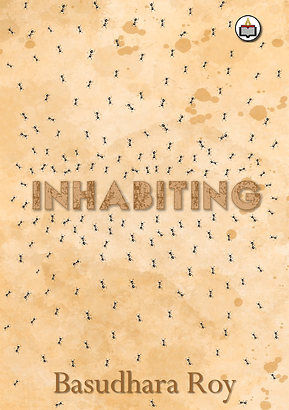One of the finest voices, Basudhara Roy’s third collection Inhabiting, is a rare treat to all poetry lovers. A faithful follower of Keki N Daruwalla, Adil Jussawalla and Agha Shahid Ali Basudhara Roy creates her poetic idiom that is confident and mesmerizing. Inward looking poetess-curator ( of The Hearth Within) from Jamashedpur Basudhara’s emphasis is more on aesthetic, ethical, interpersonal and self meditation than on Indian mythology and current politics of the world. She returns to her ocean spilling its sorrow. She keeps all joy held in the aura as gifts:
“I will sit tonight under my tree of words,
empty-handed, empty-hearted, ask it to describe
this exhaustion, this gash, this herb, this surfeit
with the world and never having enough to hold.” (‘Return’)
Basudhara’s soulful lines are attached with people, places, things, presences and absences. She goes back and forth by summoning the memories and thoughts, and empathy to all. These connect her unsurfaced storms and cyclones in the mind:
“Shared tea and laughter put you
on vigil. In vengeance you raise
rude walls, summon histories,” (‘Home’)
How does one lose good moments? By forgetting? By escaping from its daily rust? As an artist of words Basudhara questions again and again. Her silence is the movement between one strong note to the next. The meaning lurks within our smoothly conducted tours through the mystic world of senses and nightly dreams:
“There is a knock at the
heart’s door tonight.
A forgotten pain stands
outside like a neglected.” ( ‘ Remembered’)
Basudhara with her previous collections and poetry publications in different important journals and online platforms already established herself as an extraordinarily skilled poet, who draws symbols from life’s daily chores, home economics, the sensory world of flora and fauna, innocence of love and love’s absences. A collection to be read silently in mind’s own clock, Basudhara’s invite gold to travel and inhabit soul’s spaces. Basudhara’s intensity, confident use of feminist metaphors, beguilingly easy flow of words, and graceful use of music make Inhabiting an irresistibly engaging collection.
Poetry for Basudhara is the act of loving or not loving. Her ‘Woman-to-Woman’ is a poem about how women manage to remain creative in the midst of gender power sturcture. Women do not become hard and cold. Kitchen has a vibrant presence in many of Basudhara’s poems in this collection. Kitchen is trope where dreams are etched. Here we can smell Indian spices and hear chopping of vegetables in a rhythmic way:
“The last time you spoke of ice,
I was knitting a shawl, beside(.)
Stitching, knitting and inhabiting are her favourite symbols and with her exotic love affair we can interpret wherein limitless possibilities lay bare.
Reading her poems is falling deep in love with Basudhara’s house of words. ‘Rules for a Rape Republic’ is a social criticism. Basudhara’s words put front and center the violence, trauma, and abuse that women and their bodies are put through by men, as well as how our culture romanticizes violence against women. We are constantly bombarded with sparkling images and conceits drawn from disparate sources:
“I am lying at your feet today, Kali,
looking up at you the way Shiva must have done
all these years. Around me your abundant, disarrayed hair(.)(‘ For Kali’)
Goddess Kali is an iconic image in Indian mythology. Kali is often the quintessential feminist icon in India, unbound from certain pre-assumed cultural constructions. Goddess Kali is an electrical force as Basudhara connects her in her poems. Some poems in this collection remind us of the decisions that women have to make every day or that are made for them in a world where girls and women are abused, followed and pursued against their will, beaten, and used up by men however they please and thrown out. A radical critic of her own right and a poet Basudhara Roy explores plant symbols to represent life’s growth through time. Early Indian poetry in English often represents tree as a semantic/symbolic entity. A tree with its parts evokes the poet’s imagination but it is scarcely the botanical imagination. The tree is here either largely personified or reduced to a symbol or used as an aesthetic instrument. In other words, the arboreal entity of a tree is marginalized, and it yields its place to its semantic entity. Basudhara is readers’ delight:
“You have never been time’s beloved.
Every summer it threw a ball, you missed
being invited, most others you knew, thrilled (‘Missed’)
With her Indian English poetry is richer and more soul searching for a place in the poetry map making of the world.
Basudhara Roy’s third collection of poems is a promise of the starry night. She is soft, tough and valiant to encounter ‘undisclosed pains’ while walking in the uneven corridors of poetry at its best. Basudhara is extremely quick witted and extraordinarily adept poet, who draws symbols from a woman’s daily chores, home economics, the sensory world of flora and fauna and the inward state of the mind reaching into the highest level of poetic attention:
“I am standing in the sun today, / inviting its gold to travel/ through my pores.” ( ‘Inhabiting’)
Whisking from one poem to another in Inhabiting readers are haunted by a gusto from within–insistent, clamorous and subtle, like soft love that it holds. Basudhara is not bluntly confessional like Kamala Das or Sylvia Plath. Personally, her poems return me to the best of Pablo Neruda, Salvatore Quasimodo and John Keats, who stitch hearts forever.









A collection which will stay! Amazing vitality of words and phrases in the collection cast a magic spell on the readers. If you never read her, grab a copy and make your journey rewarding.